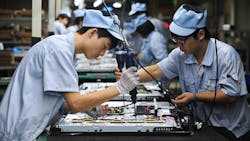BEIJING - Chinese manufacturing activity contracted further in June, data showed Monday, with a closely watched survey hitting a nine-month low and adding to signs of weakness in the world's second-largest economy.
HSBC said its final purchasing managers' index (PMI) reading came in at 48.2 last month, down from 49.2 in May and the lowest since September. It was also weaker than the bank's preliminary June figure of 48.3.
The index tracks manufacturing activity in China's factories and workshops and is a closely watched gauge of the health of the economy. A reading below 50 indicates contraction, while anything above signals expansion.
China's official PMI also showed weakness, falling to 50.1 in June from May's 50.8, mainly due to falls in output and new orders, according to the National Bureau of Statistics.
"Falling orders and rising inventories added pressure to Chinese manufacturers in June," Hong Kong-based HSBC economist Qu Hongbin said in a statement.
A shortage of funds on the country's interbank market for more than two weeks last month has probably made it harder for smaller companies to borrow money, he said.
"As Beijing refrains from using stimulus, the ongoing growth slowdown is likely to continue in the coming months."
The latest figures add fuel to concerns about the global economic powerhouse, which has shown signs of slowing growth this year.
"The magnitude of the PMI drop has shown that China's overall economic activity has decelerated further," said ANZ economists Liu Ligang and Zhou Hao in a research note.
Liquidity Squeeze
Analysts said the recent liquidity squeeze, which saw the interest rates banks charge each other surge to record highs, has added to downside risks to economic growth.
Policymakers are expected to take measures to end the credit crunch to restore market confidence, they said.
The squeeze eased last week after the central bank said it had offered funds to financial institutions and would continue to do so. It said liquidity was "ample" and the situation would gradually improve.
On Monday the seven-day repurchase agreement rate, a benchmark of interbank borrowing costs, fell to 5.43% on a weighted average basis from 6.16% at Friday's close and a record 30% hit in an isolated trade on June 20, according to Dow Jones Newswires.
But the rate remains considerably higher than the 3.30% it had averaged this year before the cash crunch started in late May.
China's State Council, or cabinet, has said authorities must "stabilize market expectations" after sharp losses in the country's key stock market.
Beijing has set a growth target for this year of 7.5%, the same aim as 2012.
The economy grew only 7.8% in 2012, its slowest annual pace in 13 years. It expanded by an annualized 7.7% in the first three months of 2013.
Beijing has said it would tolerate slower growth as it tries to make domestic demand the driver of economic growth over traditional engines such as investment and exports.
"We believe the Chinese economy is far from out of the woods yet," said Ren Xianfang, a Beijing-based analyst with research firm IHS Global Insight.
In other Asian countries manufacturing conditions also mostly contracted in June.
HSBC's June PMI for South Korea came in at 49.4, down from 51.1 in May and the first deterioration since January.
Vietnam's PMI slumped to 46.4, the third-lowest reading since the survey began in April 2011, while manufacturing activity in Taiwan contracted for the second straight month, according to the bank's releases.
Indonesia and India bucked the trend, with PMI at 51 and 50.3 respectively indicating expansion, HSBC data showed.
Copyright Agence France-Presse, 2013
About the Author
Agence France-Presse
Copyright Agence France-Presse, 2002-2025. AFP text, photos, graphics and logos shall not be reproduced, published, broadcast, rewritten for broadcast or publication or redistributed directly or indirectly in any medium. AFP shall not be held liable for any delays, inaccuracies, errors or omissions in any AFP content, or for any actions taken in consequence.
